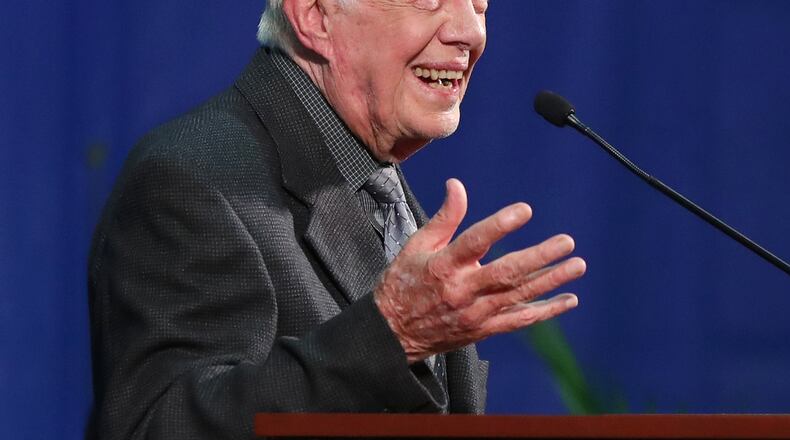He’s one of the country’s best-known Democrats, but that won’t stop Jimmy Carter from watching a Republican be sworn in as the next president of the United States.
Carter, 92, said Sunday he’ll attend president-elect Donald Trump’s inauguration in Washington D.C. on January 20. The former president and Georgia governor made the announcement at the start of the Sunday school class he was teaching at Maranatha Baptist Church in his hometown of Plains.
It's no secret that Carter supported Trump's opponent in the election. During his 39th annual Town Hall meeting with first year students at Emory University in September, Carter said Democratic nominee Hillary Clinton could count on a pretty potent voting bloc from Georgia.
“In my family we have 22 voters, direct descendants of me and (his wife) Rosalynn,” Carter said with a grin. “In the 2008 presidential campaign Obama got 22 votes out of 22. I would guess that this time Hillary Clinton will get 22 votes from the Carter family.”
Earlier in the year, when he was asked to essentially handicap the race for the Republican nomination during a speech in the august British House of Lords, Carter said he thought Trump's chances would ultimately "fade away" — although he suggested the brash New York developer might not be the worst possible choice.
If he had to choose between Texas Sen. Ted Cruz and Trump for the Republican nomination, Carter chuckled, “I think I would choose Trump, which may surprise some of you.”
(It did, judging by the loud laughter from the audience.)
“The reason is, Trump has proven already he’s completely malleable,” Carter explained. “I don’t think he has any fixed (positions) he’d go the White House and fight for. On the other hand, Ted Cruz is not malleable. He has far right wing policies he’d pursue if he became president.”
Meanwhile, Carter knows all about the highs and lows of Inauguration Day. After defeating incumbent Gerald Ford in 1976, he and his wife, Rosalynn, charmed much of the country when they alighted from their limousine and walked the post-ceremony parade route from the Capitol to the White House in frigid temperatures. Four years later, on Jan. 20, 1981, he took part in the peaceful transition of power to Ronald Reagan, who’d defeated him in his bid for a second term.
The former first couple then returned to Georgia, where they created the Carter Center and pursued what is widely regarded as one of the most important and influential post-presidential legacies. In 2002, the former president was awarded the Nobel Peace Prize for “for his decades of untiring effort to find peaceful solutions to international conflicts, to advance democracy and human rights, and to promote economic and social development.”
About the Author



